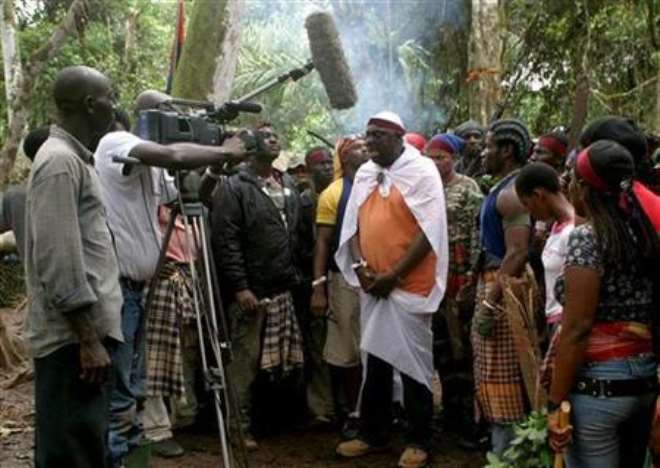AFRICA MUST LEARN FROM NIGERIA'S "MICROWAVE" MOVIES
OUAGADOUGOU (Reuters) - In the time it takes for a lovingly crafted art house movie to emerge as winner of the top prize at Burkina Faso's pan-African FESPACO cinema festival, Nigeria's prolific producers will already have churned out another 50 films.
They might be tales of cannibalism, sorcery and jealous girlfriends who shrink their errant boyfriends into bottles, but Nigeria's $450 million home video industry is the third biggest in the world, after America's Hollywood and India's Bollywood.
By contrast, FESPACO's filmmakers -- considered the best on the continent -- rely on dwindling donations, and scrabble for private financing and poor distribution deals amid a spate of cinema closures.
"Cinema is certainly dying," said Zimbabwean director Michael Raeburn, whose Johannesburg-set film "Triomf" is competing for Africa's equivalent of an Oscar. "South Africa is all about DVD and TV, no one makes any money from cinema."
Nigeria shot its first film, "Palaver" (Trouble), in 1904, and its home movie industry has been creating it ever since.
"It's not often talked of with respect," said Nigerian-born Chike Nwoffiah, whose first feature film "Sabar," set in California, is competing in the Diaspora category at FESPACO.
"It's "microwave' filming: push the button, wait three seconds and the film is done," he said. "Some of the directors can go from script to print in two weeks. The speed with which they make these films implies something is being sacrificed."
Even so, demand is rising. Last year "Nollywood" produced more than 2,000 films, up from 662 five years ago. Most films are produced in local languages -- Yoruba, Hausa and Igbo among them -- while English accounts for more than 40 percent.
"However bad the quality, Nollywood shows there's definitely a demand for African storytelling," said South African director Zola Maseko, whose film "Drum" won the prized Etalon d'Or de Yennenga in 2005. "It shows you have a whole community of people who have a deep need to see and hear themselves -- Africa hasn't had that chance."
QUALITY WILL COME
Nollywood also has growing audience among Africans living abroad, keen for a taste of home, whether watched in south London hairdressers or rented from Texas video stores.
"The Diaspora is just getting to know these films through horrible pirated copies and there is a real opening here. It's how Bollywood got started," said Vijay Mahajan, a marketing professor based in the United States who thinks Nollywood should chase after a greater slice of the 100 million Africans who live outside the continent.
"Bollywood has bought up more than 200 screens in 28 U.S. cities and Nigeria's industry should consider doing the same, he said.
Nigeria is also embracing modern digital technology at speed: there is already a 24-hour website for Nollywood internet downloads, for 5.99 pounds ($8.47) a month.
As Nigeria eyes a growing market, on the outskirts of hot, dusty Ouagadougou, FESPACO's International Film and Television Market (MICA) -- which is meant to help producers find buyers -- is wilting.
Weary hostesses wait at forlorn stands, and booth M43, allotted to the Nigerian Film Commission, is empty.
"They reserved a space but they didn't come and they didn't pay," said Chantal Belem, MICA secretary.
However much some of Africa's expertly trained filmmakers disdain Nigeria's commercial approach, others believe it is filling a gap which will bring dividends in the long run.
"It is creating a market for films. In South Africa people are already addicted, it's like crack cocaine. Over the years audiences will become more discerning," said Maseko. "Hollywood in the 1920s was no good; Bollywood in the 1960s was no good: Nollywood will have its day too."
(Editing by Daniel Magnowski)
Latest News
-
 "If You're For Me, I Am For You" - Cubana Chief P
"If You're For Me, I Am For You" - Cubana Chief P -
 "3 Days To Go" - Femi Adebayo Urges Fans To Get S
"3 Days To Go" - Femi Adebayo Urges Fans To Get S -
 "Stop Asking Me Questions About Speed Darlington"
"Stop Asking Me Questions About Speed Darlington" -
 "Benue Is The Most Underdeveloped State I've Ever
"Benue Is The Most Underdeveloped State I've Ever -
 Stan Alieke Urges Young Professionals To Take Lin
Stan Alieke Urges Young Professionals To Take Lin -
 Chizzy Alichi Teases Fans With Baby Reveal, Promot
Chizzy Alichi Teases Fans With Baby Reveal, Promot -
 "I'm Not Wearing Makeup From July 4th Till Decemb
"I'm Not Wearing Makeup From July 4th Till Decemb -
 "Stop The Challenge Of Mocking Kids With Down Syn
"Stop The Challenge Of Mocking Kids With Down Syn -
 Regina Daniels Celebrates Sons As They Mark Birthd
Regina Daniels Celebrates Sons As They Mark Birthd -
 Speed Darlington Threatens To Sue NAPTIP For Defam
Speed Darlington Threatens To Sue NAPTIP For Defam














